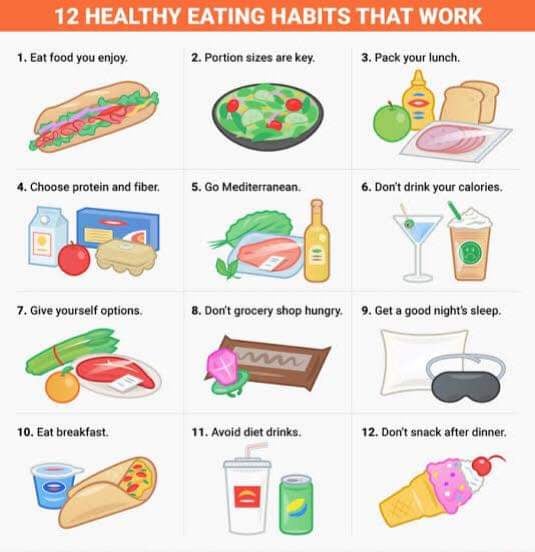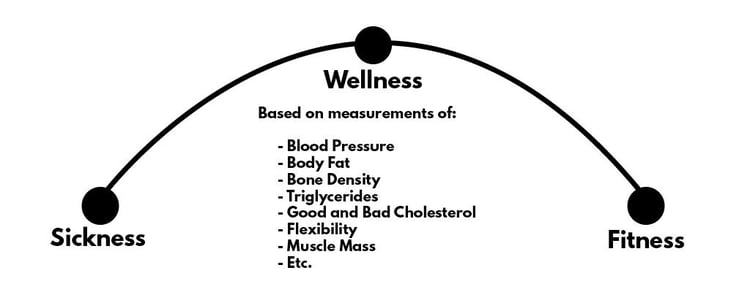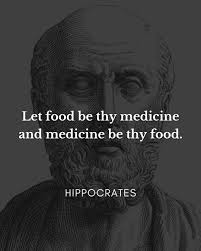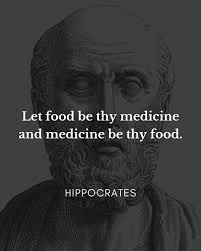What does that quote actually mean?
Whilst not found amongst his actual writings, this poignant quote from Hippocrates, the "father of western medicine" is one which is thrown around routinely by holistic health gurus, social media influencers, and both psuedo-scientists and real scientists alike. On the surface, it's relatively straight forward in it's messaging - hence it's regular appropriation. But, what does it actually mean? and if its as obvious in its messaging as it is old, why does it continue to gain traction?
Mozaffarian, Mande, and Micha (2019) believe that this traction is simply due to overwhelming evidence, that the quality of our diets is the primary driver in the prevention, treatment, and progression of most chronic metabolic diseases. However, global health care systems continue to structure themselves around reactive medical care, rather than preventative nutritional care. To truly integrate food and nutrition into health care, would require changes to current-evidence based models, changes in medical training, and a shift in priorities regarding policy and financing. Several food is medicine programs have begun to surface - such as medically tailored meals, produce prescriptions, and financial incentives that make healthy options accessible (JAMA, 2022). This doesn't just digress to a case of 'people need calories' though, that's what got us into this mess in the first place. What it calls for is nutrition security, access to nutrient density and thus a reduction in chronic disease risk (CDC, 2022).

The 'Food is Medicine Pyramid' describes tiers of intervention.
- Medically tailored meals (most intense)
- Medically tailored groceries and produce prescriptions
- Nutrition Incentives (healthy food subsides)
This all comes with the demand of policy change, through interventions such as expanding health insurance coverage for medically tailored meals or produce prescriptions, and increased government investment in nutritional research with expanded links between healthcare and food systems (NOREN/UCSF, 2020). So, with all of that in mind - what did Hippocrates mean when stating "Let food be thy medicine, and medicine be thy food"? He meant that food is our foundation, not that it replaces medicine. Should you effectively manage your nutrition, the risk factors for all metabolic dysfunction, and requirement for medical intervention - will go down.
Where are we, if not there?
Think to your most recent adventure to the local supermarket - My guess is that you were immediately confronted with a fresh produce section, and an animal produce section upon entering the store. This is naturally, fantastic, and the result of individuals and organizations pushing for easier access to nutritious foods. However, what wonders did the other 3/4 of the store hold for you? Between your fresh produce and the necessary cleaning supplies, you confronted a labyrinth of brightly coloured, price marked, eye-level confectionary goods from around the world. Shelf upon shelf of sensory stimulation - helmed by metabolic dysfunctions usual suspects.
"It's not food, it's an industrially produced edible substance" - Chris Van Tulleken

The modern diet is increasingly dominated by ultra-processed foods (UPFs), and the consequences of this are becoming harder to ignore. A 2023 review in the BMJ found links between UPFS and 32 varying adverse health outcomes, including higher risk of cancer, cardiovascular disease, mental health disorders, and premature death. More recent analysis strengthens this evidence, stating that: high UPF intake is associated with greater incidence of coronary heart disease, stroke, and overall cardiovascular disease (The Lancet, 2024), with people in the highest consumption groups facing a 15% higher risk of all-casue mortality compared to those who consume the least (systematic reviews, 2025). The writing is clearly on the wall here, there is a clear pattern - the more we rely upon industrailized, manufactured, ultra-processed foods, the greater the negative health outcomes we will experience, you'd be as well micro-dosing any range of generic toxic substances.
What have we done in light of this?
To put it bluntly, we've opted to have our cake and eat it too. Rather than state the obvious, that the 26 ingredients contained in a single Lucky Charm may not infact, be part of your recommended daily intake - modern medicine has instead turned toward pharmacology rather than intervention. The most recent example of this would be the rise of GLP - 1 receptor agonists, hailed as medical breakthroughs, offering substantial weight-loss benefits and improved blood sugar control. Yet as a JAMA commentary (2024) notes, these drugs highlight both the progress and the paradox of our approach: we’re treating the symptoms of poor diet with ever-stronger medical interventions, without changing the environment that causes them. It's the nutritional equivelant of developing lung cancer as the result of being a smoker, succesfully beating the cancer through advanced medical treatment, yet never thinking to just stop smoking.

"A weekly shot to lose-weight"
Meanwhile, research in The American Journal of Medicine argues that comprehensive nutrition strategies—medically tailored meals, produce prescriptions, and dietary reform—can often outperform pharmacologic therapy in both effectiveness and sustainability. Food remains the most potent and underused form of medicine we have; the challenge is that we’ve built a system more comfortable prescribing injections than addressing what’s on the plate.
How did we get to this point?
The modern food landscape didn't just transpire overnight, it hasn't been ushered in by some Mr.Burns/Hank Scorpio esq. supervillain.

"This is Scorpio. I have the doomsday device, you have 72hrs."
This is a monster which we ourselves engineered. A behemoth which snowballed from the rapid advancements in processing and food storage from the second world war, conjoined with the generational nostalgia of family outings to fast foods outlets, and meals shared around the TV screen. With every generation however, the outings became more frequent and affordable, the evening meals around the TV screens became the standard, and the processed became ultra-processed. Story and Popkin (2008) showed detail of this change in food environment, where people live, work, and shop now dictates what and how they eat. Fast-food outlets cluster in lower-income areas, convenience foods fill workplaces and schools, and aggressive marketing normalizes constant snacking. In conjunction with this, research in Neuroscience & Biobehavioral Reviews (Gearhardt et al.) describes how highly processed foods are designed to exploit the brain’s reward systems much like addictive substances, combining refined carbohydrates, fats, and flavors in ways that trigger dopamine release and drive compulsive overeating. Together, these forces have created an ecosystem that makes the unhealthy choice the easiest - and often the cheapest. Food addiction and environmental design aren’t separate problems; they’re two sides of the same modern epidemic.
What can we do with this information?
You could start by taking responsibility and ownership for your own health, and not resigning yourself to doing what others do simply because it's the done thing. There's an underlying theme here of a widespread lack of accountability. A lack of accountability on the part of the product manufactures, the regulatory bodies, and the consumers. It's unfortunatley become a noble and encouraged pursuit to simply accept that this is how it is, that we're becoming overweight, metabolically damaged, and chronically unwell - the narrative is acceptance, never resistance. From there, take back control of your food - A systematic review in the Journal of Nutrition Education and Behavior (Reicks et al., 2014) found that people who learn to cook and prepare meals at home consistently improve their diet quality, eat more fruits and vegetables, and consume fewer ultra-processed foods. Yet knowing what to do is rarely the problem - it’s following through. The Transtheoretical Model of Behavior Change (Prochaska & Velicer, 1997) reminds us that transformation happens in stages: awareness, preparation, action, and maintenance. Sustainable nutrition habits aren’t born from radical overhauls but from small, repeated wins - choosing to cook one meal a day, swapping a packaged snack for real food, or modeling these choices for those around us.

Real medicine happens when daily behavior aligns with long-term intention.
What if i don't want to make changes?
I get it, I honestly do. We live in a world which is inundated with tons of overwhelming health information. You've probably read a million blogs like this one, each one grandstanding a little bit more than the last, even worse if it's come from the mouth of some would-be influencer that has never actually struggled with their health or fitness. However, Choosing not to change doesn’t mean standing still - it means moving backward.

Nearly every measurable value of health can be placed on a continuum that ranges from sickness to wellness to fitness - Greg Glassman
The Global Burden of Disease Study (Afshin et al., 2019) found that poor diet is now responsible for more deaths worldwide than any other modifiable risk factor, contributing to millions of preventable cases of heart disease, stroke, and diabetes each year. Life expectancy in many developed nations has plateaued or even declined in recent years (Choi et al., 2021), a reversal largely attributed to lifestyle-related illnesses. And the consequences extend beyond lifespan: research in Human Reproduction Update (Skakkebaek et al., 2016) shows global declines in male fertility and reproductive health - trends linked to obesity, endocrine-disrupting chemicals, and poor metabolic function. In short, our collective refusal to change the way we eat is shortening our lives, weakening future generations, and eroding the health of societies built on convenience over care. It is another cruel irony in the timeline of our food history: That our efforts to streamline food production for the betterment of the human race is now the primary driver in our slow decline and departure.
Well, what now?
If Hippocrates is correct, if food is medicine, then our food systems are the hospital we all share. The EAT–Lancet Commission on Food, Planet, Health (Willett et al., 2019) makes it clear that personal health and planetary health are inseparable—our diets shape not only our bodies but the stability of ecosystems, climate, and future food security. A shift toward predominantly plant and animal based, minimally processed diets could prevent millions of deaths each year while dramatically reducing environmental degradation. Yet as Frank et al. (2020) argue, the solution isn’t purely individual—it’s collective. Health is a shared ethical responsibility, woven through policy, culture, and community. Reclaiming food as medicine means recognizing that every choice, from the farm to the fork, is both a personal act of care and a contribution to the greater good.


